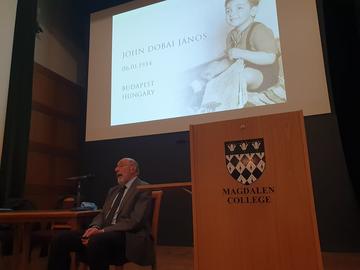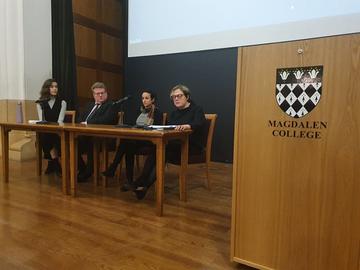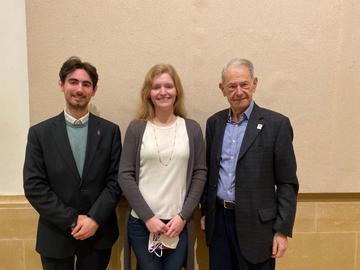The Oxford Holocaust Memorial Events Series 2022 | Blog post

The Oxford Holocaust Memorial Events Series 2022, led by Barnabas Balint (Doctoral candidate in History at Magdalen College) came to a close recently after seven successful events hosted across four weeks in January to February. The series brought together people from diverse backgrounds across the UK and beyond to learn about the Holocaust and consider its contemporary relevance for our world today.
This project was supported by TORCH as part of the Humanities Cultural Programme. Read more on the full project here.
To date the series has been attended by over 600 people, a number that continues to rise as recordings from the online events are available to re-watch on the TORCH YouTube channel and via the TORCH website. Read on for audience reviews from the series:
OxHMD22 - Review Statements from in person event attendees
Emily Farley – Oxford Brookes, HET Regional Ambassador
'Having attended several of the Holocaust Memorial Day events at Oxford university, both offline and online, I can say that the experience was both insightful and inspiring. The academics provided relevant expertise and were very open to discussion on sensitive topics. The interdisciplinary panel was particularly interesting as there were several different perspectives which made for a rousing discussion. Meeting the academics beforehand gave me an extra insight into their work around Holocaust commemoration and how they came to work in the subject area in general. A particularly interesting conversation I had with Dr. Steve Muir around his niche research - we discussed the role of music within dictatorships including examples such as Shostakovich and Wagner. His expertise was so interesting and I left the event with so many more questions. I think the event enhanced my knowledge which I can lend to my role as an ambassador for the Holocaust Educational Trust.'
Lena Zlock, DPhil Education, Linacre College
'On 25 January 2022, audiences in Magdalen College’s Grove Auditorium were treated to an inspiring lecture by John Hajdu MBE. Mr. Hajdu survived the Budapest ghetto hiding in the closet of a neighbour who risked their life to save him and his aunt. Following the war, Mr. Hajdu fled Budapest as the city came under siege from the Soviet Army, escaping across the border to Austria and eventually making his way to the United Kingdom where he became an upstanding member of his community. A recurrent theme of Mr. Hajdu’s talk was ‘who would have thought?’ Indeed, his story shows how it was resilience and bravery in the face of the unknown that saved him in the most troubled moments of the 20th-century. The most touching detail was a photograph of the teddy bear Mr. Hajdu carried with him as a child and then as an adult when he ran for his freedom. I was fortunate to meet Mr. Hajdu following the lecture, and to share with him how his life resonated with the history of my family, who also lived through the Holocaust and came as refugees from the Soviet Union. It brought me great comfort to know we were not alone in the struggles we faced, and that the stories of countless others just like us were being told by master storytellers like Mr. Hajdu.'
Cailee Davis, DPhil Oriental Studies, St. Anne's College Fiona Zeka, BA English, Hertford College
'As we approach a post-witness world, the opportunity to listen to—and speak with—Holocaust survivors is one which cannot be taken for granted. As part of the incredible OxHMD series, I had the privilege of attending a talk by John Dobai, a Jewish survivor of wartime Budapest. Not only was John an engaging and thought-provoking speaker, but he was also a deeply compassionate individual with whom I was able to speak privately regarding my own work with Holocaust memory in the 2nd and 3rd generations. John offered critical insight into familial trauma and the inherited memory of the Holocaust, speaking of his own daughter and her connection to the event of which her father was a victim and survivor. Overall, John’s closing remarks embodied the very purpose of the OxHMD series: that it is now the responsibility of current generations to continue preserving Holocaust memory and to act as witnesses for future generations regarding one of the greatest tragedies in modern memory.'
Fiona Zkea, BA English, Hertford College
I loved the process of chairing the interdisciplinary panel on Holocaust research, education, and memory. Hearing the academics talk about all their various areas of expertise and interacting with each other, as well as the audience, was really rewarding. As a Regional Ambassador for the Holocaust Educational Trust, my past work has revolved around the arts, including working on an exhibition at the Jewish Museum in London and a national online exhibition for HMD. Being able to discuss the many ways we can remember the Holocaust, from music studies to gender studies, was really illuminating.
Lucy Barker, BA History, The Queen's College
'It was sobering yet fascinating to hear John Hajdu speak about his memories of wartime discrimination and persecution, his experiences of the Communist regime, and his successes in building a life in the UK following his escape from Hungary in 1956. The subsequent Q+A session offered the audience a chance to address John directly, which led to multiple personal questions about identity, and an overall stimulating conversation. Being able to speak with him further, over tea, was also useful because, as a third-year historian writing my BA dissertation on the Hungarian Holocaust, I gained inspiration to include his memoir in my work. We were also joined by members of the Oxford Hungarian Society, so we engaged in a conversation in complete Hungarian about Hungarian culture, language and current political affairs - which was a strong reminder of how important and unforgettable our roots can be.'

John Dobai, Image © Barnabas Balint

Interdisciplinary panel on holocaust research memorial and education, Image © Barnabas Balint

Barnabas Balint, Lena Zlock and John Hajdu, Image © Barnabas Balint
If you attended or watched any of the events as part of the Oxford Holocaust Memorial series we would be delighted to hear your feedback. Please click here to complete a short online survey. Thank you.
With special thanks to:
|
Speakers |
Student Chairs |
Organisations |
|
Dorit Oliver-Wolff BEM |
Carys Howell |
British Association for Holocaust Studies |
|
Dr Kathrin Bachleitner |
Charlie Knight |
Holocaust Educational Trust |
|
Dr Steve Muir |
Eloise Bishop |
Holocaust Memorial Day Trust |
|
Dr Zoe Waxman |
Fiona Zeka |
Magdalen College Trust |
|
John Dobai |
Kirsty Robson |
Oxford Hungarian Society |
|
John Hajdu MBE |
Robert Szirmai |
Show Racism the Red Card (Scotland) |
|
Martin Winstone |
The Oxford Research Centre in the Humanities |
|
|
Prof. Christopher Browning |
||
|
Prof. Edward Westermann |
||
|
Prof. Stefan Kuhl |
||
|
Prof. Wendy Lower |
||
|
Robert Rinder MBE |
||
To learn more about this series, supported by TORCH as part of the Humanities Cultural Programme, please click here.


